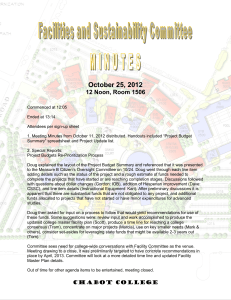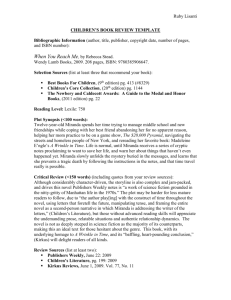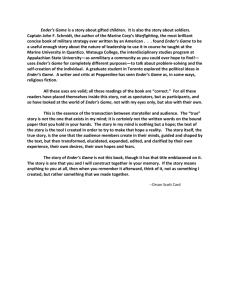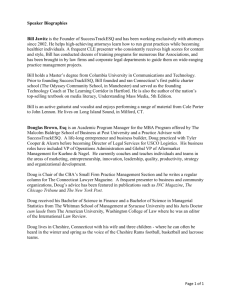Grade 8 2016 Summer Reading Summer Reading Purpose Statement
advertisement
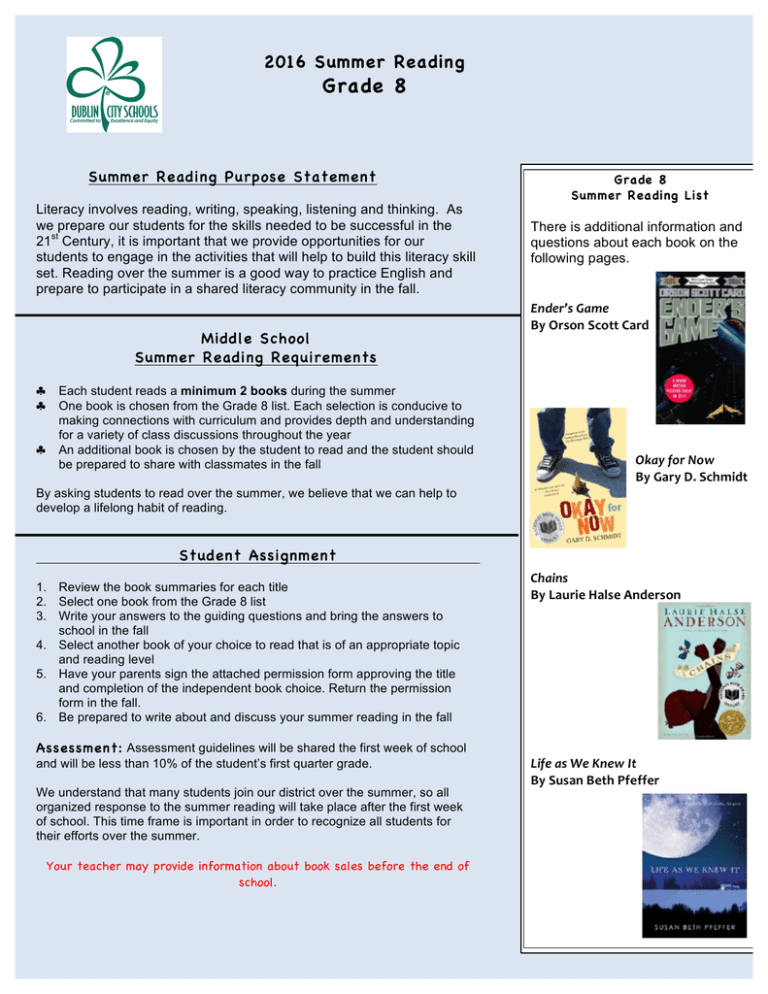
2016 Summer Reading Grade 8 Summer Reading Purpose Statement Grade 8 Summer Reading List Literacy involves reading, writing, speaking, listening and thinking. As we prepare our students for the skills needed to be successful in the 21st Century, it is important that we provide opportunities for our students to engage in the activities that will help to build this literacy skill set. Reading over the summer is a good way to practice English and prepare to participate in a shared literacy community in the fall. Middle School Summer Reading Requirements ♣ ♣ ♣ Each student reads a minimum 2 books during the summer One book is chosen from the Grade 8 list. Each selection is conducive to making connections with curriculum and provides depth and understanding for a variety of class discussions throughout the year An additional book is chosen by the student to read and the student should be prepared to share with classmates in the fall By asking students to read over the summer, we believe that we can help to develop a lifelong habit of reading. Student Assignment 1. Review the book summaries for each title 2. Select one book from the Grade 8 list 3. Write your answers to the guiding questions and bring the answers to school in the fall 4. Select another book of your choice to read that is of an appropriate topic and reading level 5. Have your parents sign the attached permission form approving the title and completion of the independent book choice. Return the permission form in the fall. 6. Be prepared to write about and discuss your summer reading in the fall Assessment: Assessment guidelines will be shared the first week of school and will be less than 10% of the student’s first quarter grade. We understand that many students join our district over the summer, so all organized response to the summer reading will take place after the first week of school. This time frame is important in order to recognize all students for their efforts over the summer. Your teacher may provide information about book sales before the end of school. There is additional information and questions about each book on the following pages. Ender’sGame ByOrsonScottCard OkayforNow ByGaryD.Schmidt Chains ByLaurieHalseAnderson LifeasWeKnewIt BySusanBethPfeffer 2016 Summer Reading Grade 8 Ender’s Game by Orson Scott Card ISBN: 978-0812550702 Summary: (Excerpt from amazon.com review) Intense is the word for Ender’s Game. Aliens have attacked Earth twice and almost destroyed the human species. To make sure humans win the next encounter, the world government has taken to breeding military geniuses and then training them in the arts of war. The early training, not surprisingly, takes the form of “games”. Ender Wiggin is a genius among geniuses; he wins all the games. He is smart enough to know that time is running out. But is he smart enough to save the planet? Questions: 1. Explain the powerful relationship between children and adults in this novel. Why are they so important to the story? Support your response with evidence from the text. 2. In this novel there is no idealized, perfect, good person. Ender represents the best that a person can do, given circumstances of life. Explain what this means and why you think Ender is or is not the best person for this. 3. Choose one of the following quotes from the novel and explain what you think it means and how it relates to the novel and the games. “Human beings are free except when humanity needs them. Maybe humanity needs you to do something. Maybe humanity needs me - to find out what you’re good for. We might both do despicable things, Ender, but if humankind survives, then we were good tools.” or “In the moment when I truly understand my enemy, understand him well enough to defeat him, then in that very moment I also love him. I think it’s impossible to really understand somebody, what they want, what they believe, and not love them the way they love themselves.” Okay for Now by Gary D. Schmidt ISBN: 978-0544022805 Summary: (From Houghton Mifflin Harcourt) As a fourteen-year-old who just moved to a new town, with no friends and a louse for an older brother, Doug Swieteck has all the stats stacked against him. So begins a coming-of-age masterwork full of equal parts comedy and tragedy from Newberry Honor winner Gary D. Schmidt. As Doug struggles to be more than the “skinny thug” that his teachers and the police think him to be, he finds an unlikely ally in Lil Spicer - a fiery young lady who “smelled like daisies would smell if they were growing in a big field under a clearing sky after a rain.” In Lil, Doug finds the strength to endure an abusive father, the suspicions of a whole town, and the return of his oldest brother, forever scarred, from Vietnam. Together, they find a safe haven in the local library, inspiration in learning about the plates of John James Audubon’s birds, and a hilarious adventure on a Broadway stage. In this stunning novel, Schmidt expertly weaves multiple themes of loss and recovery in a story teeming with distinctive, unusual characters and invaluable lessons about love, creativity, and survival. Questions: 1. Doug has a difficult family life. His father behaves less like a parent and more like a bully, but in Marysville, Doug meets other adults who show him kindness and compassion. Name a few of the adult characters in Okay for Now who offer Doug guidance and instruction. What does Doug learn from them? Support your response with evidence from the text. 2. What are two surprising developments in this story? After these “secrets” are revealed, think back at the foreshadowing clues that may have hinted that these secrets existed. 3. How has Doug changed over the course of the book? What do you think contributed to these changes? Explain in detail three ways Doug changed throughout the book. Support your response with evidence from the text. 2016 Summer Reading Grade 8 Chains by Laurie Halse Anderson ISBN: 978-1416905863 Summary: (From Booklist) In the spring of 1776, Isabel, a teenage slave, and her sister, Ruth, are sold to ruthless, wealthy loyalists in Manhattan. While running errands, Isabel is approached by rebels, who promise her freedom (and help finding Ruth, who has been sent away) if she agrees to spy. Using the invisibility her slave status brings, Isabel lurks and listens as Master Lockton and his fellow Tories plot to crush the rebel uprisings, but the incendiary proof that she carries to the rebel camp doesn’t bring the desired rewards. Isabel finds that both patriots and loyalists support slavery. Overwhelmed with domestic concerns, Isabel and indeed all the women in the household learn about the war from their marginalized position: they listen at doors to rooms where they are excluded, and they collect gossip from the streets. Anderson explores elemental themes of power, freedom, and the sources of human strength in this searing, fascinating story. The extensive back matter includes a documented section that addresses many questions about history that readers will want to discuss. Questions: 1. Characters often change and grow in response to challenges they face. What challenges did Isabel face and how do they change her? Support your response with evidence from the text. 2. What qualities does Isabel inherit from her parents? How do they give her inner strength to protect her sister and survive in New York? Support your response with evidence from the text. 3. What does Isabel mean when she says, "I was chained between two nations"? There are several references to chains throughout the novel. How is the word "chain" used as a symbol in the novel? Life as We Knew It by Susan Beth Pfeffer ISBN: 978-0399164057 Summary (from School Library Journal): Pfeffer tones down the terror, but otherwise crafts a frighteningly plausible account of the local effects of a near-future worldwide catastrophe. The prospect of an asteroid hitting the moon is just a mildly interesting news item to Pennsylvania teenager Miranda, for whom a date for the prom and the personality changes in her born-again friend, Megan, are more immediate concerns. Her priorities undergo a radical change, however, when that collision shifts the moon into a closer orbit, causing violent earthquakes, massive tsunamis, millions of deaths, and an upsurge in volcanism. Thanks to frantic preparations by her quick-thinking mother, Miranda’s family is in better shape than many as utilities and public services break down in stages, wild storms bring extremes of temperature, and outbreaks of disease turn the hospital into a dead zone. In Miranda’s day-by-day journal entries, however, Pfeffer keeps nearly all of the death and explicit violence offstage, focusing instead on the stresses of spending months huddled in increasingly confined quarters, watching supplies dwindle, and wondering whether there will be any future to make the effort worthwhile. Questions: 1. If you were in a situation like Miranda, how would you react to this horrific event? What would you be capable of doing in order to survive? 2. How would you describe Miranda’s relationship with her mom and two brothers? How do their relationships change throughout the book? Support your response with evidence from the text. 3. What would be the hardest part for you if you were living through this: no phone, television, or internet, not leaving your house, living in fear, lack of food, not seeing friends, not knowing what the future holds, or some other aspect? Independent summer Reading Parent/Guardian Permission Form All Dublin Middle School Language Arts students are required to read a book of their choice over the summer as part of our summer reading program. This book may be fiction or nonfiction, classic or contemporary, serious or funny. We would like students to consider books that will be appropriate for a school setting and sufficiently challenging in terms of reading level. Students will have an opportunity to share this summer read with other students in the class during the first week of school. All students are expected to bring this permission form to their English teachers on the first day of school. Please print. Student’s name: Title of the Book: Author: I have reviewed my student’s Independent Choice Book and have determined that it is appropriate for my child’s middle school Language Arts classroom and this assignment. I can verify that my child has completed the reading of this book. Signature of the Student: Date: Signature of the Parent/Guardian: Date:
